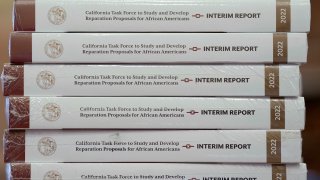
A community organization that pushed to create the first-in-the-nation African American reparations task force in California is urging Gov. Gavin Newsom to veto legislation extending the deadline for the committee to complete its work.
The Coalition for a Just and Equitable California and other organizations sent a letter to Newsom, a Democrat, last week saying that the legislation by Assemblymember Reggie Jones-Sawyer, a task force member, would send a demoralizing message to African Americans already skeptical that they will receive reparations.
The task force’s final report assessing the compensation owed to descendants of enslaved people will be released within its original time frame — by July 1, 2023 — even if the legislation is approved, Jones-Sawyer said. But he argues that the committee needs to remain intact long enough to lobby “on what we believe reparations should be or to have additional meetings.”
“We’re going to turn our report in on time,” he said. “We’re going to go ahead and ask for reparations on time.”
Get San Diego local news, weather forecasts, sports and lifestyle stories to your inbox. Sign up for NBC San Diego newsletters.
The legislation changes the sunset date from July 1, 2023, to July 1, 2024, extending what was originally a two-year committee to three. The bill also allows the nine task force members, appointed by Newsom and the two legislative leaders, to be removed at any time. The provision was included in case a member does something “problematic,” Jones-Sawyer said.
Chris Lodgson, an organizer with the Coalition for a Just and Equitable California, said the task force has not requested nor needs more time. Allowing members to be removed makes the process political, he said.
“We’re hearing concerns that it’s not going to happen, that this is not going to result in anything,” he said. “This is why we do not need a delay of this work.”
His coalition helped push for groundbreaking legislation in 2020 to create a task force to study the effects of slavery. The mission of the committee, which met for the first time in June 2021, is to document California’s role in perpetuating discrimination against African Americans, craft an official government apology and draft a comprehensive reparations plan.
National reparations advocates have praised California for providing leadership in a country where reparations efforts have stalled in Congress.
The task force voted 5-4 in March to limit reparations to the descendants of Black people who were in the U.S. in the 19th century, overruling Jones-Sawyer and others who wanted to expand compensation to all Black people in the U.S., regardless of ancestry. The latter group argued it may be too hard for people to prove their ties to enslaved ancestors and that all Black people suffer discrimination regardless of lineage.
The task force is scheduled to meet on Sept. 23 and 24 in Los Angeles for the first time since it released its exhaustive report on how the effects of slavery still linger in California and nationally through large disparities between white and Black communities in health, income, education, incarceration and employment.
Jones-Sawyer said the task force may need to double its work to complete the final report on time, but ultimately Californians will be “very, very proud of the work that we’ve done.”
“I honestly believe it will be the benchmark that everybody uses in this country on reparations,” he said.
Task force chair Kamilah Moore declined to comment, saying rules prevented her from speaking on pending legislation or matters to come before the group.
The governor’s office declined to comment on the pending legislation.
___
Associated Press writer Sophie Austin in Sacramento also contributed to this report. Austin is a corps member for the Associated Press/Report for America Statehouse News Initiative. Report for America is a nonprofit national service program that places journalists in local newsrooms to report on undercovered issues. Follow Sophie Austin on Twitter.

